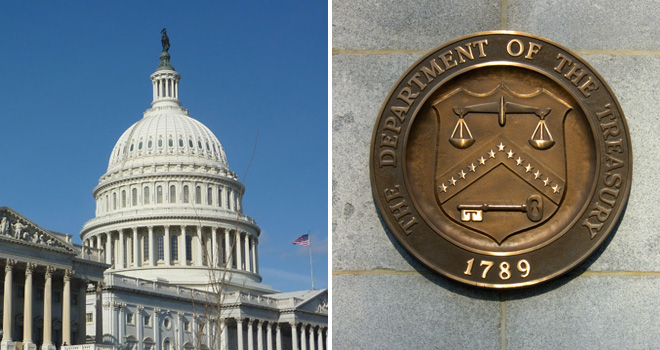As nearly every news cycle over the last few weeks has been dominated by how much the U.S. government owes, who we owe it to, and what could potentially happen if we don’t figure out a way to raise the debt ceiling, there is a simple question: why do we even have this thing?
Simple. Congress wanted checks and balances to the checks and balances.
The debt limit was established in 1917, specifically as a way to help fund the American participation in WWI through Liberty Bonds, but on a base level it became a way for the legislative branch to control federal spending. Or rather, another way. As any civics text book will tell you, Congress has the power of the purse. It has become a reality of the relationship between Congress and the Executive that the debt ceiling has to be raised periodically in statute, allowing the Treasury department to borrow more and manage the nation’s current debt: we’ve broken through the ceiling ten times since 2000.
At first, Congress established statutory rights for the Treasury to create specific debt: T-Bills, a loan to build the Panama Canal, and so on. In 1939 Congress ditched the specific limits and established an overall one, the one that’s been raised numerous times and is currently starring Washington in the face.
As a governing tool, the ceiling has its critics. There is an inherent advantage for Congress in the policy and politics of the debt ceiling: the House and Senate appropriate funds in the form of the federal budget, which very well could run up against the debt ceiling, which in turn becomes a problem for the executive branch, who has to then turn around and ask for a debt limit increase. Former President Bill Clinton put it this way in a recent interview:
Sharply criticizing Congressional Republicans in an exclusive Monday evening interview with The National Memo, Clinton said, ‘I think the Constitution is clear and I think this idea that the Congress gets to vote twice on whether to pay for [expenditures] it has appropriated is crazy.’
So in periods of divided government, Congressional opposition to the President can both craft a federal budget and then hammer that President for requesting a debt ceiling increase so that the Treasury can pay already incurred government debt.
Beyond the political, other criticism is related to economic policy and the charge that the current debt ceiling process is a “weakness in the U.S. budgetary framework,” according to a Government Accounability Office (GAO) report.
The GAO interviewed experts who have worked with debt and budget issues from a range of political and policy prospectives, from both our government and foreign states. One of the initial conclusions is that “delinking” the budgeting process from the statutory debt limit causes unnecessary apprehension. This is of course perfectly clear in the current debate over raising the debt ceiling, as credit ratings agencies have been showing their unease on U.S. debt for some time now.
The GAO analysis also cited a proposed solution advocated by “some budget experts and a former Treasury official”: Congress could delegate authority to Treasury to borrow as needed to fund congressionally approved expenditures subject to a periodic review. So instead of a debt ceiling vote, we’d have debt hearings, but without the threat of immediate instability we are currently experiencing.
Of major note here is just how alone the U.S. is in this economic policy dance between the legislative and executive branches of government. Of the countries that the GAO reviewed, only Denmark had an actual fixed debt limit that was set by legislation. All others gave authority to their respective treasuries to manage their debt.
The debt ceiling as a concept in legislative practice is certainly in keeping with our governing principles: it forces a public vote from our elected representatives, and thus an ensuing public debate that the country can weigh in on. But the U.S. is nearly alone in making fiscal policy of this magnitude and of this nature an occasional shouting match between political opponents.









